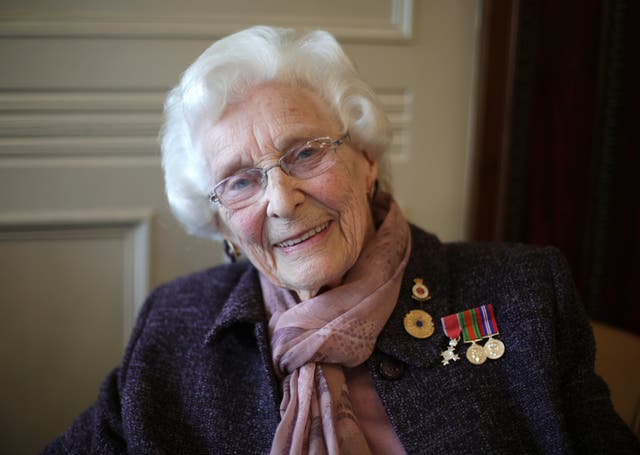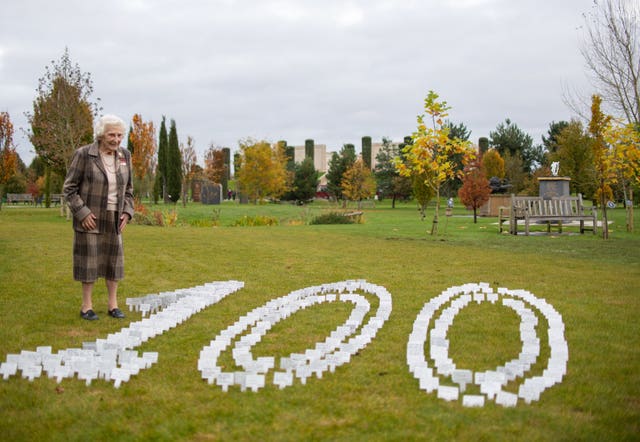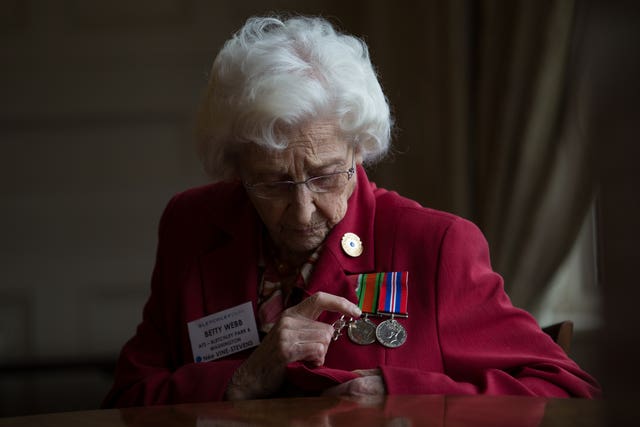West Midlands woman who became 'inspiring' Bletchley Park codebreaker dies aged 101
Charlotte ‘Betty’ Webb died on Monday, the Women’s Royal Army Corps Association said.
Watch more of our videos on ShotsTV.com
and on Freeview 262 or Freely 565
A Bletchley Park codebreaker who “inspired women in the Army for decades” has died at the age of 101.
Charlotte “Betty” Webb MBE, who was one of the last surviving codebreakers from Bletchley Park in Buckinghamshire, died on Monday, the Women’s Royal Army Corps Association said.
She worked at Bletchley Park as a member of the Auxiliary Territorial Service (ATS), from 1941 to 1945, indexing German messages and paraphrasing Japanese signals, Bletchley Park said.
She later paraphrased Japanese messages at The Pentagon in the US, during the Pacific War, and was also awarded France’s highest distinction, the Legion d’Honneur, in 2021, for her work in the ATS.

Mrs Webb, from Wythall in Worcestershire, worked at Bletchley Park initially as a secretary, which she said was “pretty boring but had to be done”, until she moved into paraphrasing in F block.
A German speaker, her job was taking decoded messages and reordering the unencrypted wording to be sent to Allied commanders, so that if intercepted by the enemy, they would not discover their transmissions were being deciphered.
Mrs Webb was 18 and studying at domestic science college near Shrewsbury in Shropshire when she and several others on her course decided “we ought to be serving our country rather than just making sausage rolls”.
She started volunteering for the ATS in 1941, according to an interview she gave as part of the Bletchley Park oral history project in February 2012.
She completed her basic training in Wrexham at the Royal Welch Fusiliers’ barracks before being taken to London for an interview and then immediately to Bletchley Park.
Mrs Webb remembered registering messages immediately without any training, and said they were told to just “get on with it”, before being taken into a separate room occupied by a “rather severe” Army captain and given the Official Secrets Act to read.

She said every message that came in had to be registered. About 10,000 messages came into Bletchley Park each day, all requiring sorting and storing correctly.
Mrs Webb was then moved into the Japanese section, paraphrasing the translated Japanese messages, and was sent to Washington in May 1945 to assist with the Pacific War effort.
Mrs Webb never told anyone about her work and it remained a secret until 1975. She was never able to tell her parents as they had already died.
From then, she gave talks to schools and other organisations and wrote a book about her experiences.
For services to remembering and promoting the work of Bletchley Park, she was made an MBE in 2015.
Mrs Webb was also invited to King Charles’s coronation in 2023, for which she had a front row seat, which she told the BBC was “magnificent”.

In a tribute on Tuesday, the Women’s Royal Army Corps Association said: “Last night we lost a proud ATS and WRAC veteran, Bletchley codebreaker, Knight of the Legion d’Honneur, WRAC Association member, and president of our Birmingham branch.
“Betty inspired women in the Army for decades and we will continue to take pride in her service during WWII and beyond, and as a champion of female veterans.”
In a statement, Bletchley Park said her contributions to the estate’s work during the Second World War and to ensuring its legacy, will “never be forgotten”.
They said: “Betty was not only a member of the incredible team at Bletchley Park during World War Two, but she also dedicated much of her life to raising the profile of Bletchley Park in more recent years.
“Her tireless efforts in bringing the history of Bletchley Park to a wider audience, through sharing the stories of those who worked here, helped ensure that the vital role of Bletchley Park during World War Two, and its impact on the conflict, was recognised.
“Betty’s passion for preserving the history and legacy of Bletchley Park has undoubtedly inspired many people to engage with the story and visit the site. Betty’s impact at Bletchley Park will be remembered for many years to come.”
Iain Standen, chief executive of Bletchley Park Trust, added: “The Trust was very sad to learn of Betty’s death.
“She will be remembered, not only for her work at Bletchley Park during World War Two, but also for her efforts to ensure that the story of what she and her colleagues achieved is not forgotten.
“She was an unrivalled advocate and supporter of the heritage site that Bletchley Park is today.
“Whether through media interviews, events or books, Betty has been involved in spreading the word about Bletchley Park for many, many years.
“Our thoughts are with her family, friends and all those who were touched by her warmth, dedication and exceptional work.”





